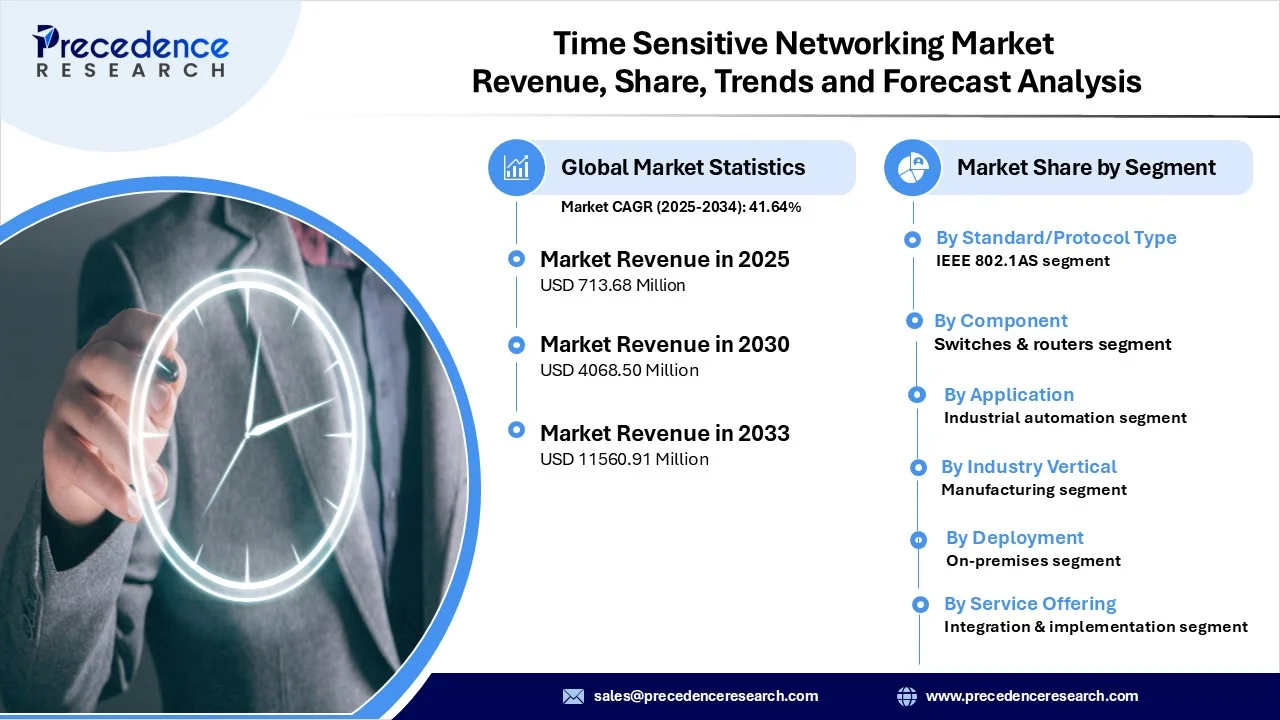Time Sensitive Networking Market Revenue to Attain USD 11,560.91 Mn by 2033
Time Sensitive Networking Market Revenue and Trends 2025 to 2033
The global time sensitive networking market revenue reached USD 713.68 million in 2025 and is predicted to attain around USD 11,560.91 million by 2033 with a CAGR of 41.64%. This market is expanding rapidly because industries increasingly demand ultra-low latency, deterministic communication for real-time automation, control, and synchronization in Ethernet networks.

What are the Major Factors Boosting the Time Sensitive Networking Market?
The market is experiencing growth due to several factors. The implementation of Industry 4.0 and IoT solutions demands deterministic and synchronized data flows, leading to the convergence of IT and OT networks and the need for unified, time-aware Ethernet standards. The development of autonomous and smart systems requires precise timing and minimal delay, and TSN has matured with the emergence of open standards to reduce integration risks. Additionally, increasing investments in edge computing and the integration of 5G/TSN, coupled with the need for real-time monitoring and industrial control, are pushing organizations to adopt TSN for reliable communications in complex networks.
Segment Insights
- By standard/protocol type, the IEEE 802.1AS segment dominated the market in 2024, as it provides accurate clock synchronization for distributed systems in TNS deployment.
- By component, the switches & routers segment dominated the market in 2024, as they are foundational components of TSN infrastructure, ensuring synchronized and reliable data flow, meeting the stringent performance requirements of applications like industrial automation, autonomous vehicles, and smart manufacturing.
- By application, the industrial automation segment dominated the time sensitive networking market in 2024 due to the growing need for real-time, deterministic communication in smart factories and Industry 4.0 environments.
- By industry vertical, the manufacturing segment led the market with the largest share in 2024. This is because of its strong demand for real-time, synchronized communication to support automation, robotics, and data-driven operations.
- By deployment/network architecture, the on-premises segment dominated the market, as manufacturers and critical operations prefer on-premises deployment to maintain full control over data, ensure real-time processing, and meet stringent reliability and security requirements, especially in sectors like automation, automotive, and energy.
- By service offering, the integration & implementation segment dominated the market because seamless deployment of TSN solutions requires specialized expertise to ensure compatibility with existing network infrastructure and industry protocols.
Regional Insights
Europe led the time sensitive networking market, with Germany, France, and the Nordics driving demand for deterministic Ethernet due to their prominence as industrial automation centers. EU policies supporting Industry 4.0, standardization, and smart manufacturing will further boost TSN demand in Europe. European manufacturers and consortia are often early adopters and contributors to TSN standardization.
Asia-Pacific is projected to experience the most rapid growth, fueled by fast industrialization in countries like China, India, South Korea, and Southeast Asia. There is a high demand region for TSN due to substantial investments in smart factories, government incentives for digital transformation, and a growing electronics and automotive manufacturing base.
Time Sensitive Networking Market Coverage
| Report Attribute | Key Statistics |
| Market Revenue in 2025 | USD 713.68 Million |
| Market Revenue by 2033 | USD 11,560.91 Million |
| CAGR from 2025 to 2033 | 41.64% |
| Quantitative Units | Revenue in USD million/billion, Volume in units |
| Largest Market | Europe |
| Base Year | 2024 |
| Regions Covered | North America, Europe, Asia-Pacific, Latin America, and the Middle East & Africa |
Recent Development:
- In June 2024, Avnu Alliance announced its new Component Certification program, enabling industrial, automotive, and ProAV devices to achieve enhanced time synchronization, bounded latency, and reliability. This is the first program to certify TSN capabilities based on IEEE 802.1 standards. (Source: https://www.controlglobal.com)
Get this report to explore global market size, share, CAGR, and trends, featuring detailed segmental analysis and an insightful competitive landscape overview @ https://www.precedenceresearch.com/sample/6926
You can place an order or ask any questions, please feel free to contact us at sales@precedenceresearch.com |+1 804 441 9344